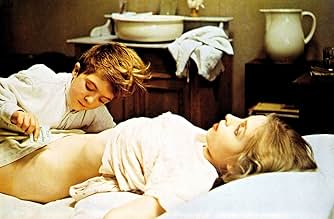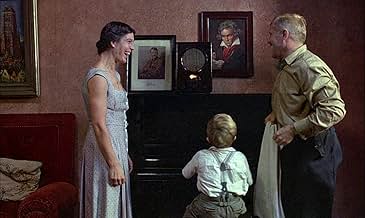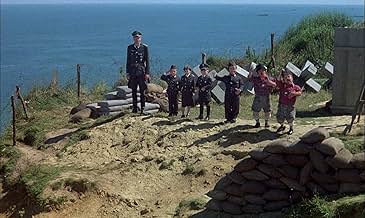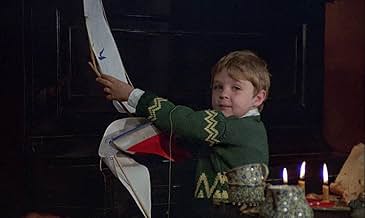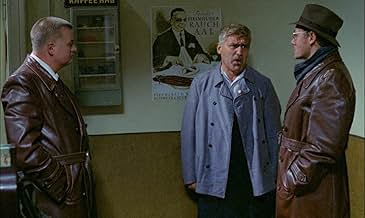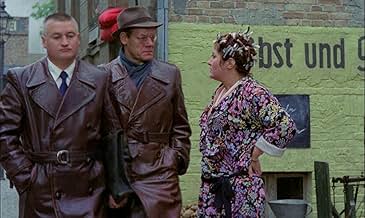En 1924, Oskar Matzerath naît dans la ville libre de Danzig. À l'âge de trois ans, il tombe dans l'escalier et cesse de grandir. En 1939, la Seconde Guerre mondiale éclate.En 1924, Oskar Matzerath naît dans la ville libre de Danzig. À l'âge de trois ans, il tombe dans l'escalier et cesse de grandir. En 1939, la Seconde Guerre mondiale éclate.En 1924, Oskar Matzerath naît dans la ville libre de Danzig. À l'âge de trois ans, il tombe dans l'escalier et cesse de grandir. En 1939, la Seconde Guerre mondiale éclate.
- Réalisation
- Scénario
- Casting principal
- Récompensé par 1 Oscar
- 18 victoires et 6 nominations au total
- Lina Greff
- (as Andréa Ferreol)
- Der Alte Heilandt
- (as Helmuth Brasch)
Avis à la une
The film is filled with moral ethics and symbolism. The tin drum Oscar always drums on is a symbol of his protest against the cruelty that grown ups create, not to mention the rise of Nazism. Die Blechtrommel even has large scenes that are only for symbolism. It is probably one of the most important German films since WW2. Somehow, the German make the best films that decipher Nazism and WW2 (like Stalingrad and the new Der Untergang) which very clearly shows their self awareness. I think Die Blechtrommel is one of the finest examples of this.
It is often quite absurd this film, one of the most memorable scenes is when Oscar watches a Nazi rally. As an officer is marching through the crowd, the orchestra is playing a march. Oscar starts playing his drum, and make all the musicians play false, and after a while they all start to play "An der Schönen blauen Donau" and the crowd starts to dance.
Die Blechtrommel is one of the most memorable films ever, whet ever you liked it or not. Some scenes are very sick, and i do not encourage people who don't have a stomach for strong films to see this. For other film lovers though, this is one of the greatest films ever.
Things I saw in this movie that vividly stuck in my brain are such things as a huge eel being pulled out of a severed horses head that was just dragged from the sea on a rope, a soldier having carnal knowledge with a lady in the middle of a field while being hunted by another soldier, a young boy spitting into a hand of a young girl ...
And I could go on. This movie I found to be extremely unique and varied in many ways. I don't know that I can really recommend this movie all in all, but if you do watch it, be prepared for a very unique experience film wise.
Beamer
I do wonder how much of my love for this film is owed to the Gunter Grass novel on which it's based It's a quirky slab of magic realism to be sure, like the film, but I have no idea how closely it hews to the original.
The performances are nuanced and striking in places. The cinematography is appropriately dreary and the editing crisp and unadorned. The centerpiece though, is the performance by the child actor at the core of the film. How much is owed to his voice-over narrative, I don't know, but the man growing inside of the still-grown little boy was handled just beautifully.
It's a disturbing and strangely uplifting movie at once. I recommend it -- especially for those who have seen only black and white view of World War II and the typically American view of our adversaries in German.
Le saviez-vous
- AnecdotesDavid Bennent has a condition which caused him to grow very slowly. When he appeared in this film at age 11, he was 1.14 meters (3 ft. 9' in.) tall. He continued to grow to 1.55 m (5 ft. 1 in), and was still growing well into his thirties.
- GaffesWhile the German soldiers attack the Polish post office, one fires an MG42 machine gun from his shoulder. The German army didn't use that weapon before 1942. It's also not supposed to be fired while standing.
- Citations
Oskar Matzerath: There once was a drummer. His name was Oskar. He lost his poor mama, who had eat to much fish. There was once a credulous people... who believed in Santa Claus. But Santa Claus was really... the gas man! There was once a toy merchant. His name was Sigismund Markus... and he sold tin drums lacquered red and white. There was once a drummer. His name was Oskar. There was once a toy merchant... whose name was Markus... and he took all the toys in the world away with him.
- Versions alternativesAlthough reluctant to do so the BBFC were forced to remove 19 secs from UK cinema and video versions under the Protection of Children Act to remove a scene showing Oskar pressing his face against Maria's pubic region. The cuts were waived in 2003 when it was decided that the scene did not constitute an indecent image.
- ConnexionsFeatured in Pieces of Silver (1989)
Meilleurs choix
Détails
- Date de sortie
- Pays d’origine
- Site officiel
- Langues
- Aussi connu sous le nom de
- El tambor de hojalata
- Lieux de tournage
- Sociétés de production
- Voir plus de crédits d'entreprise sur IMDbPro
Box-office
- Montant brut mondial
- 7 469 $US
- Durée2 heures 22 minutes
- Couleur
Contribuer à cette page



